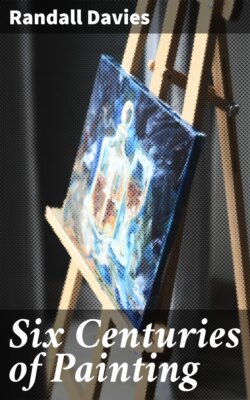Six Centuries of Painting

Реклама. ООО «ЛитРес», ИНН: 7719571260.
Оглавление
Randall Davies. Six Centuries of Painting
Six Centuries of Painting
Table of Contents
INTRODUCTORY
TUSCAN SCHOOLS
I
II
III
IV
V
VI
VII
VENETIAN SCHOOLS
I
II
III
SPANISH SCHOOL
FLEMISH SCHOOL
I
II
III
DUTCH SCHOOL
I
II
III
IV
V
GERMAN SCHOOLS
FRENCH SCHOOL
I
II
THE ENGLISH SCHOOL
I
II
III
IV
THE NINETEENTH CENTURY
I
II
III
IV
V
INDEX
FOOTNOTES:
Отрывок из книги
Randall Davies
Published by Good Press, 2019
.....
Here, as in his allegorical pieces, Giotto appears as a great innovator, a number of situations suggested by the Scriptures being now either represented for the first time or seen in a totally new form. Well-known subjects are enriched with numerous subordinate figures, making the picture more truthful and more intelligible; as in the Flight into Egypt, where the Holy Family is accompanied by a servant, and three other figures are introduced to complete the composition. In the Raising of Lazarus, too, the disciples behind the Saviour on the one side and the astonished multitude on the other form two choruses, an arrangement which is followed, but with considerable modification, in Ouwater's unique picture of the same subject now in the Kaiser Friedrich Museum at Berlin. This approach to dramatic reality sometimes assumes a character which, as Kugler puts it, oversteps the strict limits of the higher ecclesiastical style. It is worth noting, however, that the early Netherlandish school—as we shall see in a later chapter—developed this characteristic to a far greater extent, continuing the tradition handed down, quite independently of Giotto, through illuminated manuscripts, and with less of that expression of the highest religious or moral feeling which is so evident in Giotto.
The few existing altar-pieces of Giotto are less important than his frescoes, inasmuch as they do not admit of the exhibition of his higher and most original gifts. Two signed examples are a Coronation of the Virgin in Santa Croce at Florence, and a Madonna, with saints and angels on the side panels, originally in S. Maria degli Angeli at Bologna, and now in the Brera at Milan. The latter, however, is not now recognised as his. The earliest authentic example is the so-called Stefaneschi altar-piece, painted in 1298 for the same patron who commissioned the Navicella. Giotto's highest merit consists especially in the number of new subjects which he introduced, in the life-like and spiritual expression with which he heightened all familiar occurrences and scenes, and in the choice of the moment of representation. In all these no earlier Christian painter can be compared with him. Another and scarcely less important quality he possessed is in the power of conveying truth of character. The faces introduced into some of his compositions bear an inward guarantee of their lively resemblance to some living model, and this characteristic seems to have been eagerly seized upon by his immediate followers for emulation, as is noticeable in two of the principal works—in the Bargello at Florence, and in the church of the Incoronata at Naples—formerly attributed to him but now relegated to his pupils. The portrait of Dante in a fresco on the wall of the Bargello shows a deep and penetrating mind, and in the Sacraments at Naples we find heads copied from life with obvious fidelity and such a natural conception of particular scenes as brings them to the mind of the spectator with extraordinary distinctness.
.....